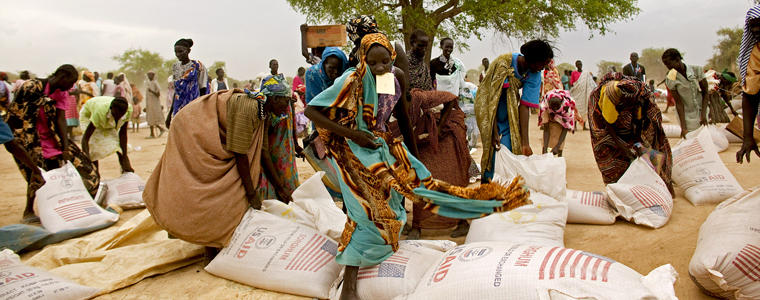Peace in Sudan
USIP’s Andrew Blum and Jon Temin discuss the recent troubling developments in Sudan and why there are renewed concerns about prospects for peace in Sudan.

USIP’s Andrew Blum and Jon Temin discuss the recent troubling developments in Sudan and why there are renewed concerns about prospects for peace in Sudan.
- What’s the latest state of play in Sudan? What’s behind the tensions? And in which regions?
- Why does this bode so poorly for Sudan’s future?
- Why should the U.S. care about what happens to Sudan?
- What is USIP doing to help resolve the tensions?
What’s the latest state of play in Sudan? What’s behind the tensions? And in which regions?
Andrew Blum: Recently, there has been two significant escalations in violence in the Sudan border areas. On May 21, the Sudan Armed Forces (SAF) attacked and took control of the town of Abyei. The violence and looting that followed caused an estimated 80-100,000 people to flee the area. On June 6, serious fighting broke out in Kadugli, the capital of the northern state of South Kordofan, between the SAF and the SPLA, the army of South Sudan. This fighting has caused additional tens of thousands of Sudanese to flee their homes.
The ongoing violence has created a humanitarian crisis in a remote and insecure area where the delivery of aid is extremely difficult. While there are many complex reasons for the renewed violence, the common thread is an almost complete lack of trust between the governments of the North and the South. This breakdown of trust has made it impossible to resolve a range of highly-contentious issues in the border area prior to South Sudan becoming independent on July 9.
Why does this bode so poorly for Sudan’s future?
Jon Temin: The current violence may lead to further escalation of hostilities after the south secedes on July 9th. The south is clearly refraining from responding militarily to the north’s actions in the short term, but that could change after they are fully independent. It is widely understood that following secession, both countries will be economically dependent on each other and that the linkages between them will run deep, but if violence along the border continues then mobility and cooperation between the countries will be curtailed.
This is especially true concerning oil – southern Sudan has roughly 80 percent of Sudan’s oil reserves, but most of the pipelines and all of the refineries are in the north, so the north and south must cooperate for either of them to profit (and both are highly dependent on oil revenue to run their governments). If violence along the border continues it may cripple the oil industry, as many of the most productive oil fields are located just south of the border. That result would be devastating for both countries.
Why should the U.S. care about what happens to Sudan?
Andrew Blum: Sudan’s Comprehensive Peace Agreement (CPA), which ended one of world’s longest and bloodiest wars, is rightly considered a seminal peacebuilding achievement of the United States. Since 2006, the U.S. has made a significant and sustained commitment to ensure the peaceful implementation of the CPA, including the peaceful conduct of the referendum on southern secession.
In addition, the intense focus on the horrific violence in Darfur and the desire to avoid a repeat of that violence in other regions have solidified Sudan as a key U.S. foreign policy priority.
What is USIP doing to help resolve the tensions?
Jon Temin: USIP is deeply engaged on border issues, through both the Grant Program’s North-South Border Initiative, which focuses on giving grants to civil society organizations working to promote a peaceful border area, and through our on-the-ground series of workshops aimed at promoting peaceful north-south grazing corridors (there is often violence along these corridors as nomadic pastoralists bring their cattle from the north to the south during the dry season).
The Institute has also provided intellectual support to the Popular Consultation processes in Southern Kordofan and Blue Nile states on the north side of the border, and has analyzed why those processes are so important. Supporting a peaceful border area and positive north-south relations following southern secession will remain a key USIP objective.



